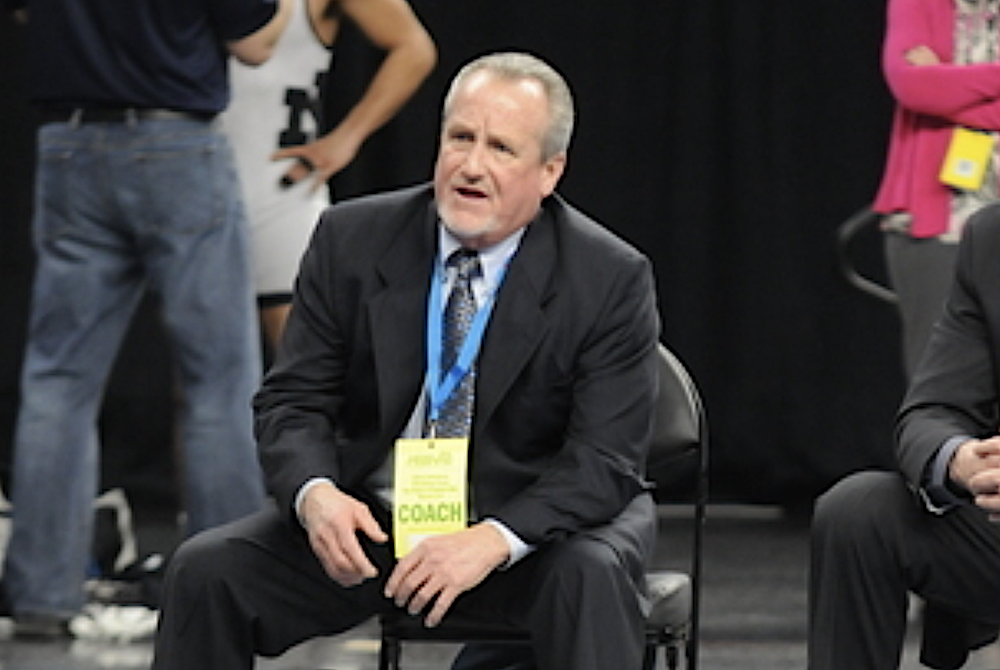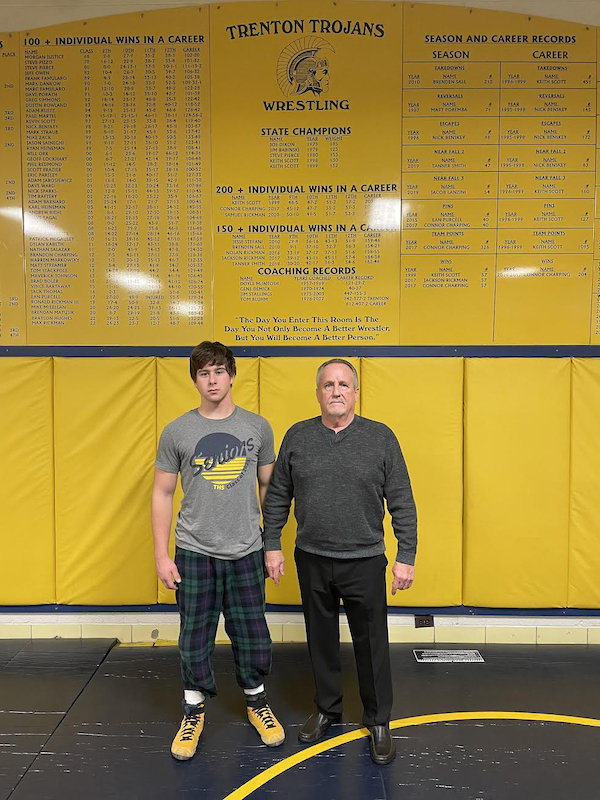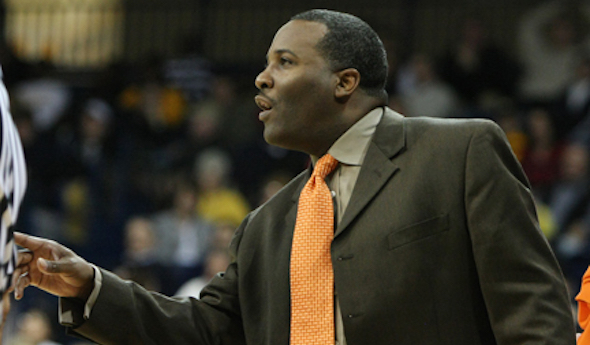
Bluhm Continues Building on Trenton Tradition in 5th Decade as Coach
By
Keith Dunlap
Special for MHSAA.com
December 22, 2022
TRENTON – What Tom Bluhm likes about wrestling also happens to correlate perfectly into what his program at Trenton has been about as of late.
 “It’s one-on-one,” Bluhm said. “You can’t hide and you can’t make excuses. That’s what I’ve always liked about it.”
“It’s one-on-one,” Bluhm said. “You can’t hide and you can’t make excuses. That’s what I’ve always liked about it.”
Excuses aren’t in the vocabulary of the Trenton program that’s been presided by Bluhm for going on 46 seasons.
Last season, the Trojans went 22-9, solid on the surface but incredible when considering Trenton had only 14 wrestlers on the team and forfeited just one weight class.
Again, Bluhm and his group weren’t interested in excuses. They just forged ahead with what they had.
“There’s no planning for it,” he said. “It’s just something that happens. It makes it tough to run practices. It’s not like you have a room of 30 or 40 guys where you can group them into three based on weight and get after it.”
Numbers haven’t traditionally been a problem for Trenton under Bluhm, who said his 1978 team had 100 wrestlers competing for spots on varsity and 50 freshmen.
In recent years, the lack of a program at the middle school level has negated opportunities to develop a feeder system, so Bluhm just hopes for the best when tryouts come around in November.
 Bluhm said it’s become an increasing scenario where athletes come out for the wrestling team who have never before wrestled in their lives.
Bluhm said it’s become an increasing scenario where athletes come out for the wrestling team who have never before wrestled in their lives.
Bluhm said one example was a sophomore who came out for the team last year, quickly learned the sport and ended up winning 36 matches.
“His mother supposedly called the AD last year saying he needed something to do because he was driving her crazy,” Bluhm said. “So he came out for wrestling.”
Nolan Diroff, a senior who primarily wrestles in the 189-pound weight class, but has also wrestled at higher weights, said the limited number of wrestlers on the team rarely comes up as a topic.
“I can’t really say that anybody has complained about not having a lot of people,” he said. “Nobody on the team complains when they get moved around in the lineup. We wrestle where Coach needs us to wrestle. We do whatever he says to try and win matches.”
Diroff said in a strange way, having a limited roster has made who is on the team better wrestlers because it has forced them to be versatile athletes who can compete at multiple weights.
“He’s kind of built us up to realize that and wrestle wherever he needs us,” he said. “He tries to get us as many matches as possible. It makes us better wrestlers and makes the team better.”
This year, there is a slight increase in the numbers.
Bluhm said there are 17 out for the team, including the first girl wrestler during his tenure.
“She fits right in,” Bluhm said. “She gets in there and does everything the boys do.”
Bluhm entered this season fourth on the MHSAA all-time coaching wins list for wrestling, carrying an 812-416-2 record with five seasons at Taylor Center before taking over at Trenton beginning with that 1977-78 winter.
Despite the struggles with numbers, Bluhm still very much gets a lot out of coaching after more than five decades.
He drives a little less than an hour to Trenton and back every day from his home in Northville, and said he’s stayed at Trenton out of his love and respect not only for the kids, but their parents.
“He tells a bunch of other stuff and random stories,” Diroff said. “Never ones that you really roll your eyes at. They are always enjoyable and shows you how long he’s been around.”
And when Trenton wrestles this season, the Trojans will do what they always do: Fight on with no excuses.
“I enjoy coaching,” Bluhm said. “I’ve always said show me some rules, and I’ll play.”
 Keith Dunlap has served in Detroit-area sports media for more than two decades, including as a sportswriter at the Oakland Press from 2001-16 primarily covering high school sports but also college and professional teams. His bylines also have appeared in USA Today, the Washington Post, the Detroit Free Press, the Houston Chronicle and the Boston Globe. He served as the administrator for the Oakland Activities Association’s website from 2017-2020. Contact him at [email protected] with story ideas for Oakland, Macomb and Wayne counties.
Keith Dunlap has served in Detroit-area sports media for more than two decades, including as a sportswriter at the Oakland Press from 2001-16 primarily covering high school sports but also college and professional teams. His bylines also have appeared in USA Today, the Washington Post, the Detroit Free Press, the Houston Chronicle and the Boston Globe. He served as the administrator for the Oakland Activities Association’s website from 2017-2020. Contact him at [email protected] with story ideas for Oakland, Macomb and Wayne counties.
PHOTOS (Top) Trenton wrestling coach Tom Bluhm coaches Connor Charping during the 2016 Individual Finals. (Middle) Bluhm and current wrestler Nolan Diroff stand in front of the program's record board. (Top photo by High School Sports Scene; middle photo courtesy of Nolan Diroff.)

Coaches Return With College Knowledge
By
Tom Markowski
Special for Second Half
February 24, 2016
North Farmington boys basketball coach Todd Negoshian is not so vain to believe he’s at the top of his profession.
 After all, he’s nearing just his fifth season running what is considered one of the top programs in the Oakland Activities Association.
After all, he’s nearing just his fifth season running what is considered one of the top programs in the Oakland Activities Association.
What Negoshian is certain of is that he is a better coach now than he was during the early 2000s when he entered the profession as an assistant at North Farmington under his father, Tom Negoshian.
In addition to Todd Negoshian’s years as a high school coach, he spent three seasons (2004-07) as an assistant coach at Oakland University under coach Greg Kampe. Having worked at the college level has not only added to his knowledge as a coach but also given him an opportunity to work with different people under different circumstances but with similar goals.
“I learned a lot from Kampe,” Negoshian said. “I learned a lot about relationships. He has the uncanny ability to (scold) a kid and then 30 seconds later have your arms around him. It’s about building relationships.
“It’s his approach to coaching. There’s so many things you learned outside of coaching.”
This brief stint at the collegiate level gave Negoshian, 35, a whole new perspective on how to coach and how to be a coach. Building relationships takes time, and to those committed to being a coach who cares about his or her players, it’s paramount to allow for that time.
Some coaches, like John Beilein at University of Michigan, start out coaching at the high school level, move on to college and remain there. A number of others statewide have taken paths similar to that of Negoshian.
LaMonta Stone at River Rouge and Steve Hall at Detroit Cass Tech started coaching at the high school level and have recently returned to their roots after each spent several years as a college coach.
Stone played for the legendary Lofton Greene at River Rouge and then coached the Panthers to a Class B title in 1999. Stone ambitiously sought a position at the next level and was quite successful. He spent two seasons at Eastern Michigan, two at Ohio State and 10 at Bowling Green before returning to River Rouge last season as head coach.
And he has no regrets.
“At that point, I had goals,” Stone said of making the jump to college. “There were things I wanted to do. I still have goals. People ask me, would I go back to college? I don’t know. If the situation was right, I might.”
Stone, 49, returned for two reasons: family and community. Last season he was able to coach his oldest son, LaMonta, Jr., his senior year. Stone also has two other sons, ages 6 and 9.
 Basketball is king in River Rouge. Greene won a record 12 MHSAA titles and the program has won two more since his departure. But the Panthers relinquished their claim as a state power soon after Stone left and haven’t been much of a factor in the tournament since. Stone intends on changing that.
Basketball is king in River Rouge. Greene won a record 12 MHSAA titles and the program has won two more since his departure. But the Panthers relinquished their claim as a state power soon after Stone left and haven’t been much of a factor in the tournament since. Stone intends on changing that.
“It’s a situation where, I’d been (coaching in college) for 14 years,” he said. “I’d reached all my goals. The only one I didn’t was to become a head coach. But you’re an assistant in the Big Ten. You can’t get much higher than that.
“The opportunity to come back to that community, I just couldn’t pass up. I get to be more of a part of my sons’ lives.”
In addition to the high school season, Stone said he enjoys coaching during the summer, in camps and individually.
“I can, within the (Michigan High School Athletic Association) rules, work with kids outside of Rouge,” he said. “I get calls all the time saying can you work with my son. I work with them but they can’t come to Rouge. I like it that way. There’s no pressure on me or them.”
Hall, 45, was one of the state’s top players when he graduated from Cass Tech in 1988. He played four years in college (Washington, Virginia Tech) before playing professionally overseas. In 1996 he became the head coach at Detroit Rogers, an all-boys school in the Detroit Public School League. Hall spent nine seasons there and won three MHSAA titles before the school closed.
Hall went to Detroit Northwestern in 2005 and spent three seasons there, winning one PSL title, before accepting a position as an assistant coach at Duquesne University in Pittsburgh. He spent four seasons there before becoming an assistant coach at Youngstown State. On Aug. 25, Hall officially came back to Detroit as athletic director and boys basketball coach at Cass Tech.
Like Stone, Hall was looking for a more stable lifestyle. Family came first, and the opportunity to coach his alma mater was too good to pass up.
“A lot had to do with my life at this stage,” he said. “I have two young boys (ages 7 and 4) and to be more a part of their lives is important. If I wanted to spend time with them, we’d go to a game where I was recruiting a kid and that would be our time together on that given day.
“And I have a passion for this school. This whole year has been learning on the fly. At Rogers there was a lack of numbers. Here football is huge. We didn’t have a football team at Rogers. And here I have a surplus of numbers. It’s a different dynamic. Rogers was the smallest school in the PSL by enrollment. Cass is the biggest.”
Hall said he doesn’t miss the hours of travelling on the road, going into countless gymnasiums recruiting players and trying to convince them and their coaches that his university was the right one. It’s not that his responsibilities as athletic director and coach are less demanding. But being able to go home every night and see his children and sleep in his bed has its rewards.
Hall said he had more than a few conversations with Stone on returning home.
All three coaches agree that experience has its benefits. It’s not that coaching is any easier at this time. The challenges are still there and in many ways demand different approaches.
“Every stop makes you better,” Negoshian said. “Anytime you coach kids, the more you are around them, it helps.
“The game has changed. Society changed. Kids don’t want to fight through tough times. That’s why you see so many transfers. Everybody wants to be the hero. They want the focus on them. And it’s just not them. It’s the family. I’m not sure all of the parents are committed. They don’t want to go to A, B and C to get to D.”
Hall said the expectations for incoming freshmen and their parents are so different than it was when he was in high school. Then students went to a certain school, whether it was a power like Detroit Southwestern or a neighborhood school like Detroit Mumford, to be a part of an established program.
“It’s a trickle down from college,” Hall said. “It’s not, ‘I want to send my kid to a great program.’ There’s the attitude that if my son isn’t a part of it as a freshman, I’ll go somewhere else instead of being part of the process.”
 Tom Markowski is a columnist and directs website coverage for the State Champs! Sports Network. He previously covered primarily high school sports for the The Detroit News from 1984-2014, focusing on the Detroit area and contributing to statewide coverage of football and basketball. Contact him at [email protected] with story ideas for Oakland, Macomb and Wayne counties.
Tom Markowski is a columnist and directs website coverage for the State Champs! Sports Network. He previously covered primarily high school sports for the The Detroit News from 1984-2014, focusing on the Detroit area and contributing to statewide coverage of football and basketball. Contact him at [email protected] with story ideas for Oakland, Macomb and Wayne counties.
PHOTOS: (Top) Current River Rouge boys basketball coach LaMonta Stone returned to his alma mater after serving as a college assistant including at Bowling Green. (Middle) Todd Negoshian, LaMonta Stone, Steve Hall. (Top photo courtesy of LaMonta Stone.)

